10 Gangster Films From Abroad: Part II
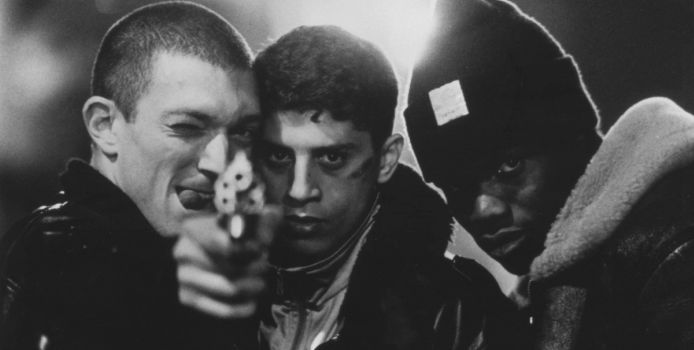
Massive film lover. Whether it's classic, contemporary, foreign, domestic, art,…
This is a continuation of “Beyond Hollywood’s Mafia” with more great gangster films from around the world. There’s a rich tapestry in this field to draw from, as films influence filmmakers, writers and directors making more and more fascinating movies about crime.
Some directors may have already appeared in the first list, but all these titles are new and differ, one way or another from the first installment, enjoy!
10. Graveyard of Honor (1975, Japan)

The gangster films of Kinji Fukasaku are devoid of the fraternal honor and loyalty you are likely to find in an average film about the mafia or organized crime. This doesn’t exactly come as a surprise, seeing as his five film saga is titled Battles Without Honor and Humanity, oaths are sworn and rapidly broken in the dog eat world that was post WWII Japan; a consistently recurring setting for Fukasaku’s Yakuza movies.
Graveyard of Honor features on one of the most reprehensible characters in the history of gangster films: Rikio Ishikawa, a real-life gangster from the director’s own Mito district in Japan. Rikio Ishikawa (played by Fukasaku regular Tatsuya Watari) whose reputation for unscrupulous and unwarranted violent outbursts defied every rule and boundary leading to exile from the pitfalls of Japans impoverished postwar underworld.
Graveyard of Honor benefits tremendously from the director’s documentary-like style that draws the viewer into the bombastic path of destruction that lies in Ishikawa’s exploits. Kinji Fukasaku’s (intentionally) blurry window into the actualized portrait of a mad dog Yakuza allows you to see just enough, and simultaneously spares you from viewing too much.
However if you want the latter, watch the 2003 remake by Takashi Miike.
9. Romanzo Criminale (2005, Italy)
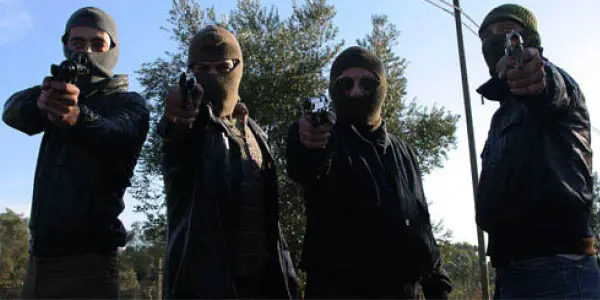
Formulaic (in the best sense of the word) gangster saga about three friends: Ice, Lebanese, and Dandi whose criminal instincts raise them from childhood delinquents to ruling over Rome in the 1970’s.
If Matteo Garrone’s Gomorrah is unapologetic about its depiction of the Italian mafia, then Romanzo Criminale is equally unapologetic for glamorizing its protagonists’ life of crime. And that’s exactly why it’s such a pleasure to watch. Michel Placido’s isn’t trying to open Pandora’s Box, but entertain his audience with this intelligently assembled, fast-paced saga. Following the mold of the “rags to riches” storytelling device, while the story moves from humble beginnings to the eventual fall from grace. Not the most original model, but in this film the punchy direction make the narrative flow, and appealing characters who are always fun to watch,if at times a tad cliche. This may not sound like a flattering portrait, but Romanzo Criminale is a great deal of fun with plenty of action, and political intrigue along the way.
The overall result of Romanzo Criminale is two and a half hours or seriously gratifying entertainment. The performances are enjoyable, the pacing is tight, and the content is fascinating as a fictional narrative as well as a historical time capsule.
8. Tsotsi (2005, South Africa)
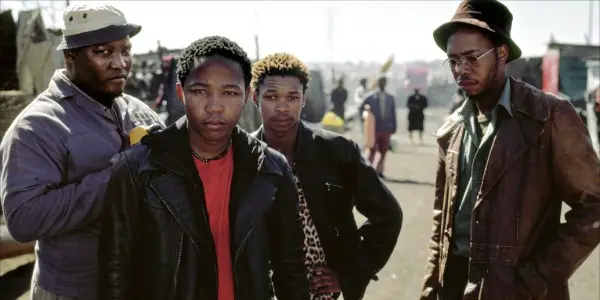
This Oscar-winning thriller chronicles the awakening of a young, cold-blooded hoodlum whose sense of humanity awakened after shooting a woman and stealing her car only to find her infant child in the back seat. The leading character ( played by magnetic newcomer Presley Chweneyagae ) Tsotsi, which translates to “thug”, seems to be a presence of fear and intimidation to everyone he encounters. However, his cold-eyed exterior is then shattered when unwittingly comes to the care of an infant child. After going about life with no regard for anything living, Tsotsi undergoes an awakening while reconciling the damaging nature of his childhood that could have led him on the path that he is on.
The various hot-button issues that permeate the uncertain stature of South Africa’s economy are touched upon, but the film stays on track with its narrative, however it’s obvious that director Gavin Hood isn’t going to ignore economic and social issues, but Tsotsi is very much a character-driven film. Tsotsi feels fresh, and there’s no similar film out there; it is easily one of the more unique titles in the genre of gangster movies. Taking place in Johannesburg South Africa, Tsotsi is vibrant and full of energy, not just because of the untamed camera movement or its contemporary feel but the vigor from its cast and unpredictable, tight narrative.
7. Get Carter (1971, UK)

I once asked someone if they had seen the original Get Carter and their reply was, “it’s not that great, it’s just Michael Caine running around London (the film was actually shot in Newcastle) with a shotgun!”, of course my reply was, “Exactly, that’s what makes it so great!”. Of course, there’s more to Mike Hodges’ Get Carter than that, but the image of Michael Caine with a scatter gun deserves be as iconic as Al Pacino’s M-16 toting Scarface, but lives in the shadows of the inferior 2000 remake of the same name.
The prime components in this film are Michael Caine’s performance, location shooting, simple, effective story, and immensely strong direction from Mike Hodges. Jack Carter tears his way through the underworld in order to avenge the death of his brother. Get Carter qualifies as a gangster movie but it’s really a vengeance story as Carter will beat, torture, and shoot anyone who gets in the way of his rampage for justice regarding his brothers mysterious death.
The film is tough, violent and regarded as one of the best British films of all time. Interesting trivia: many of the films locations in Newcastle became landmarks solely because of the scenes shown in Get Carter. Namely the Trinity Car Park was preserved for years because it was prominently featured in the film and became known as “The Get Carter Car Park”, it was eventually torn down in 2007.
6. The Mission (1999, Hong Kong)

Johnnie To’s first in an unofficial trilogy is one of the director’s best action/gangster movie; its deceptively simple tale tells the story of an ace team assembled to protect a Triad boss who has survived a botched assassination attempt. The team is made up of To regulars and some of Hong Kong actors alumni, Simon Yam, Lam Suet, Roy Cheung, Jackie Lui, Francis Ng, and Anthony Wong. What The Mission is all about is the mission at hand, and the crew of bodyguards are some of the most professional players in cinema history.
Johnnie To plays out gunfights and scenes of action with mathematical precision, and his trademark eye for detail is in full form. Action set pieces are thoughtfully choreographed, the settings all have a slick, modern sheen and style reflective of the polished neon world of post-handover Hong Kong. The sense of brotherhood and unity ring true, and Johnnie To’s frequent collaborating actors make magic together. Whether they’re engaged in a firefight, adjusting their handguns, or playing with a crumpled piece of paper, every scene is mapped out attention to detail.
It can be said that Johnnie To is Hong Kong’s answer to Michael Mann, due to his technical prowess and eye for detail regarding action scenes. The following films in the unofficial trilogy would be Exiled and Vengeance, have recurring characters from The Mission but don’t live up to the first, in terms of precision and execution. For reasons beyond understanding there’s limited availability of The Mission on home video, maybe a Criterion release could be on the horizon?
5. La Haine (1995, France)
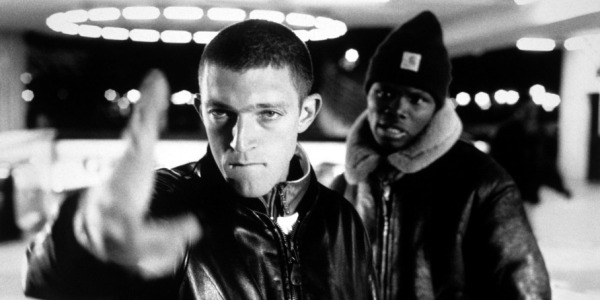
On the outskirts of Paris in the Banlieu district, racial tensions are erupting between the French, Arabic, and African populations and the increased police presence are only fanning the flames. Less a gangster film, and more a study of the social unrest in France’s low-income areas, La Haine is hard hitting, stylish, and occasionally funny. But the result is a broiling, street savvy, film that has a strong sense of social identity.
Almost as if to reduce their metaphysical status in order to represent the racial tensions while putting a face to the unheard population of the disenfranchised underclass, the three misfits who lead the film (played by Vincent Cassel, Saïd Taghmaoui, Hubert Koundé) are comprised of a Jew, an Arab, and a Black. They are more victims of circumstance than gangsters, left to wander into crime due to a system that denies them a part in society.
At some points, La Haine is a “cool” movie considering its style and humor. Yet, it also draws a line in the sand between its humor and its potent dramatic gravitas. Gangster movies come in all forms, but they can also have a message that dares to step outside the simple coda of “crime doesn’t pay” and that’s La Haine accomplishes with near perfection.
4. Borsalino (1970, France)
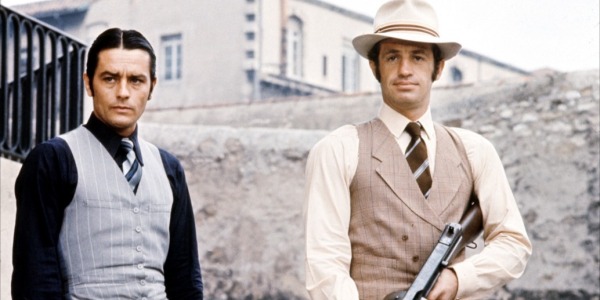
French cinema has a reputation for being too artistic or unapproachable, but Borsalino is pure entertainment. A great starring vehicle for its two larger than life leading stars (who better than to play gangsters?), Alain Delon and Jean-Paul Belmondo, who were tailor-made for the film.
Taking place in 1930’s Marseilles, Borsalino is a relatively simple story about the ascension of two likable hoods: Capella (Belmondo) and Siffredi (Delon) and their eventual dominance of Frances criminal underworld. With a story as simple as this, some people might be saying; “that’s it?”, but the key word here is “fun” and that’s precisely what this movie is.
Borsalino is well directed, wonderfully acted and decorated with a sense of style that succeeds in capturing the essence of the 1930’s. Imagine taking the story of Wiliam Wellman’s The Public Enemy, update it to the 1970’s, transplant the story from Chicago to France, including a sense of humor about itself as a genre piece. The characters do what they are expected to do, and the action takes the turns we expect it, but it’s consistently punctual with style and fun complimented with two leading actors who are at the top of their game.
Seeing as the movie is named after a type of hat popular with gangsters, doesn’t that inform us that Borsalino will be an exercise in style? The film was a major success in France that it brought a resurgence in Borsalino hats.
3. Animal Kingdom (2005, Australia)

David Michôd’s debut feature film Animal Kingdom is a magnificent variation on the gangster film that centers on teenager “J” who is then adopted by his grandmother and her three gangster sons after his mother overdoses on heroin. J, whose soft-spoken nature could either interpreted as being youthfully naive, or as being the smartest person in the room by keeping to himself, for fear of being ensnared in the family’s shady goings-on.
Animal Kingdom is a tough film, meaning that it is directed with tact and a trepid eye for nostalgia; “Deal or no Deal” is playing on the television while EMT’s wheel out the lead character’s dead mother, and the group Air Supply will officially take on an unnerving second life for you after watching this movie.
The film is handled by what feels like a veteran director; a film as tense and intelligent as Animal Kingdom promises quality and insight. Not that this genre lacks originality, but you can usually tie a string from one title to another and see some connective tissue between gangster films. But Animal Kingdom is its own kind of movie, and the only artistic likeness you can link to Animal Kingdom would be the Shakespearean angle that exists within the three brothers and their patriarchal mother.
A truly original and magnetic film that demands to be seen with a great cast. James Frecheville, Ben Mendelson, Joel Edgerton, Jacki Weaver, and the unfortunately underutilized Guy Pearce struts his talent as one of the few honest police officers in the district. Animal Kingdom hits all the right notes and the film’s status as a classic is assured.
2. Rainy Dog (1997, Japan)
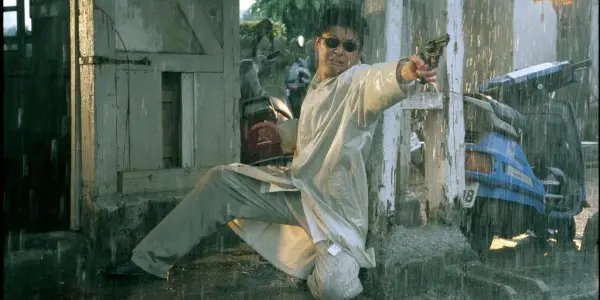
The second installment in Takashi Miike’s unofficial “Black Society Trilogy” is one of the director’s more restrained movies. However, if you are familiar with Takashi Miike (director of Ichi the Killer, Audition, and 13 Assassins ) then you know that means it will be anything but tame. Rainy Dog may wade in some dark water, but its underlying themes of humanity keep it from straying into the murky territory as it explores human relationships and how these formed bonds become tested under duress.
Yuji (played by Sho Aikawa) is an estranged Yakuza hit-man stuck in Tepei City, China; he is a textbook loner. When he is unexpectedly reunited with his estranged son, things take an unexpected turn. With his newly refound son in tow, Yuji befriends a prostitute and a familial unit is formed between the three misfits.
Other images that have great staying power include (and not limited to) a motorbike buried in the sand, hiding out in an abandoned WWII pillbox, and of course Sho Aikawa’s potent, yet minimalist humanistic performance, while gunning people down in the rainy streets of Taipei. Although Takashi Miike’s Rainy Dog is a more meditative entry in the filmmaker’s omnibus, it still packs a punch and there’s plenty of action.
1. Infernal Affairs (2002, Hong Kong)

Known now to many American viewers as “the film that inspired The Departed”, Infernal Affairs has enjoyed some moderate attention in the wake of Scorsese’s Oscar winning epic. But Infernal Affairs is more than just a template for The Departed when you consider its influence and content.
Some gangster films focus on police in pursuit of gangsters, gangsters eluding the police, or the loyalty that exists within a criminal syndicate, Infernal Affairs explores all of that and does so in a tightly packaged, and sleekly delivered manner. In Infernal Affairs, Triad gangsters have trained a mole to rise to the top of the police department, and the police have planted a rat within the Triad. After ten years of spying, a dynamic game of cat and mouse ensues; the noose tightens for both the gangster -turned-police mole, as well as the police-turned-gangster informant.
Infernal Affairs is conducted by a team of veteran talents form Hong Kong’s elite movie making team: its director Andrew Lau with forty-two feature film credits, its two leads Andy Lau (not to be confused with the director) and Tony Leung, plus Kelly Chan, Anthony Wong, and finally, Eric Tsang playing against type (known mostly as a comedic actor in Hong Kong) as the gang boss. All of this firepower makes a boom, Infernal Affairs is a great piece of filmmaking and should be ranked among the best in the genre.
It seems as if gangster pictures from country to country vary on theme and tone. Is there something you think some of these movies are missing? Or is there something else you’d like to see from films in the genre as far as motifs are concerned?
Share your thoughts below!
(top image: La Haine – source: Canal+)
Does content like this matter to you?
Become a Member and support film journalism. Unlock access to all of Film Inquiry`s great articles. Join a community of like-minded readers who are passionate about cinema - get access to our private members Network, give back to independent filmmakers, and more.
Massive film lover. Whether it's classic, contemporary, foreign, domestic, art, or entertainment; movies of every kind have something to say. And there is something to say about every movie.













